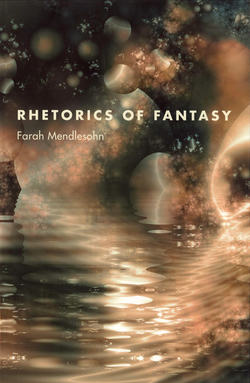Rhetorics of Fantasy

Реклама. ООО «ЛитРес», ИНН: 7719571260.
Оглавление
Farah Mendlesohn. Rhetorics of Fantasy
Contents
Acknowledgments
Introduction
A Note on the Selection of Texts
The Categories
The Portal-Quest Fantasy
The Immersive Fantasy
Intrusion Fantasy
The Liminal Fantasy
The Irregulars
Chapter 1. The Portal-Quest Fantasy
Early Quest and Portal Fantasies
Tolkien and Lewis
The Modern Era: Brooks and Donaldson to the 1990s
The Subversion of the Portal-Quest Fantasy
Chapter 2. The Immersive Fantasy
Rationalized Fantasy
Critical Distance: The Protagonist as Antagonist
Immersion and Reader-Protagonist Context
Casualizing the Fantastic and Making the Ordinary Baroque
Refusal and the Unexplained World
The Immersive and the Absurd and the Distillation of the World
The Inward Gaze of the Contained Land
Knowing: Worlds within Worlds
Magic Realism and the Immersive Fantasy
Chapter 3. The Intrusion Fantasy
Chapter 4. The Liminal Fantasy
Liminal Fantasy and the Tension of the Slipstream
Chapter 5 “The Irregulars”
Epilogue
Notes. Introduction (pp. xiii–xxv)
1. The Portal-Quest Fantasy (pp. 1–58)
2. The Immersive Fantasy (pp. 59–113)
3. The Intrusion Fantasy (pp. 114–181)
4. The Liminal Fantasy (pp. 182–245)
5.“The Irregulars”: Subverting the Taxonomy (pp. 246–272)
Bibliography. Nonfiction
Fiction Cited
Index
Отрывок из книги
Rhetorics of Fantasy
Farah Mendlesohn
.....
As I write, I am increasingly convinced that the primary character in the portal fantasy is the land. In Baum’s The Wonderful Wizard of Oz (1900) we can see this element emerging. Baum understood that the fantastic can be intensified if contrasted with the most mundane Real possible. Attebery writes: “Baum is doing what a painter does when he paints a large, flat, colorless area on a canvas: he is creating negative space which acts to make any positive design all the more vivid. Kansas is gray, so we begin to think about color. It is flat, so we long for contour. It is vast so we wish for something on a human scale.… Before the paragraph is done, we have been given, by contraries, a picture of Oz” (Tradition 84). This effect is intensified because in that very first (Kansas) segment, what is perhaps most noticeable is that the text is all description. There are only two lines of conversation, in which Dorothy is commanded to take refuge from the cyclone. The bleakness of Kansas is in part the absence of sound, paralleling that absence in the landscape. Dorothy’s voice is a shock as much for being a voice as it is for its merry tone, but it is also a reminder that Kansas is a set of ideas as well as a place, and that Dorothy will be taking it with her.
Once in Oz, however, conversation becomes the crux of the dynamic. Questions drive the narrative, and give rise to narrative. Speech in Oz is relatively egalitarian: one cannot tell the status of someone from the use of direct or reported speech (although Attebery points out that it is encoded in who is described and in what detail (Tradition 100).19 Reported speech is used only to relate something that we have already seen happen. In this book there is very little introspection from Dorothy; only occasionally does she feel the need to relate her tale or her emotions/reactions.20 In contrast, all the characters she encounters introduces themselves with a tale, not of where they are going or what they are doing, but of who they are. Dorothy’s narrative position, her domination of the story, comes in part from the conversational offerings of those wishing to make her acquaintance. There are four actors here, but only one is interpreting the world for us, even though the other three interpret the world for her.
.....